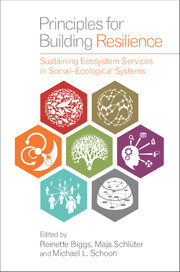Book contents
- Frontmatter
- Dedication
- Contents
- Acknowledgements
- Foreword
- List of contributors
- 1 An introduction to the resilience approach and principles to sustain ecosystem services in social–ecological systems
- 2 Politics and the resilience of ecosystem services
- 3 Principle 1 –Maintain diversity and redundancy
- 4 Principle 2 – Manage connectivity
- 5 Principle 3 –Manage slow variables and feedbacks
- 6 Principle 4 – Foster complex adaptive systems thinking
- 7 Principle 5 – Encourage learning
- 8 Principle 6 – Broaden participation
- 9 Principle 7 – Promote polycentric governance systems
- 10 Reflections on building resilience – interactions among principles and implications for governance
- Index
1 - An introduction to the resilience approach and principles to sustain ecosystem services in social–ecological systems
Published online by Cambridge University Press: 05 May 2015
- Frontmatter
- Dedication
- Contents
- Acknowledgements
- Foreword
- List of contributors
- 1 An introduction to the resilience approach and principles to sustain ecosystem services in social–ecological systems
- 2 Politics and the resilience of ecosystem services
- 3 Principle 1 –Maintain diversity and redundancy
- 4 Principle 2 – Manage connectivity
- 5 Principle 3 –Manage slow variables and feedbacks
- 6 Principle 4 – Foster complex adaptive systems thinking
- 7 Principle 5 – Encourage learning
- 8 Principle 6 – Broaden participation
- 9 Principle 7 – Promote polycentric governance systems
- 10 Reflections on building resilience – interactions among principles and implications for governance
- Index
Summary
SUMMARY
A major challenge of the twenty-first century is ensuring an adequate and reliable flow of essential ecosystem services to meet the needs of the world's burgeoning and increasingly wealthy population. This challenge needs to be addressed in the face of rapidly changing social, technological and environmental conditions that characterize the world today. Social–ecological resilience is one fast-growing approach that attempts to inform this challenge and provide practical guidance to decision-makers and practitioners. The resilience approach views humans as part of the biosphere, and assumes that the resulting intertwined social–ecological systems behave as complex adaptive systems – i.e. they have the capacity to self-organize and adapt based on past experience, and are characterized by emergent and non-linear behaviour and inherent uncertainty. A rapidly growing body of research on resilience in social–ecological systems has proposed a variety of attributes that are important for enhancing resilience. This book aims to critically assess and synthesize this literature. In this chapter we introduce the resilience approach and the process by which we identified seven generic principles for enhancing the capacity of social–ecological systems to produce desired sets of ecosystem services in the face of disturbance and change.
CHALLENGES OF A RAPIDLY CHANGING WORLD
We live in an era of rapid and unprecedented change. The past century has seen the mass production and adoption of motor cars and telephones, a 15-fold increase in the global economy, large-scale conversion of land to agriculture and an increase in the global population from 1.6 billion people in 1900 to over 7 billion in 2011 (MA 2005a; Steffen et al. 2007) (Fig. 1.1). Despite ongoing challenges with addressing poverty, these rapid changes have brought huge benefits and dramatic improvements to many people's lives, particularly since the end of the Second World War in 1945 (MA 2005a; Steffen et al. 2007). Tellingly, for most of human history the average life expectancy was 20–30 years, reflecting the combined effects of poor nutrition, disease and warfare, especially on infant survival (Lancaster 1990).
- Type
- Chapter
- Information
- Principles for Building ResilienceSustaining Ecosystem Services in Social-Ecological Systems, pp. 1 - 31Publisher: Cambridge University PressPrint publication year: 2015
- 8
- Cited by

